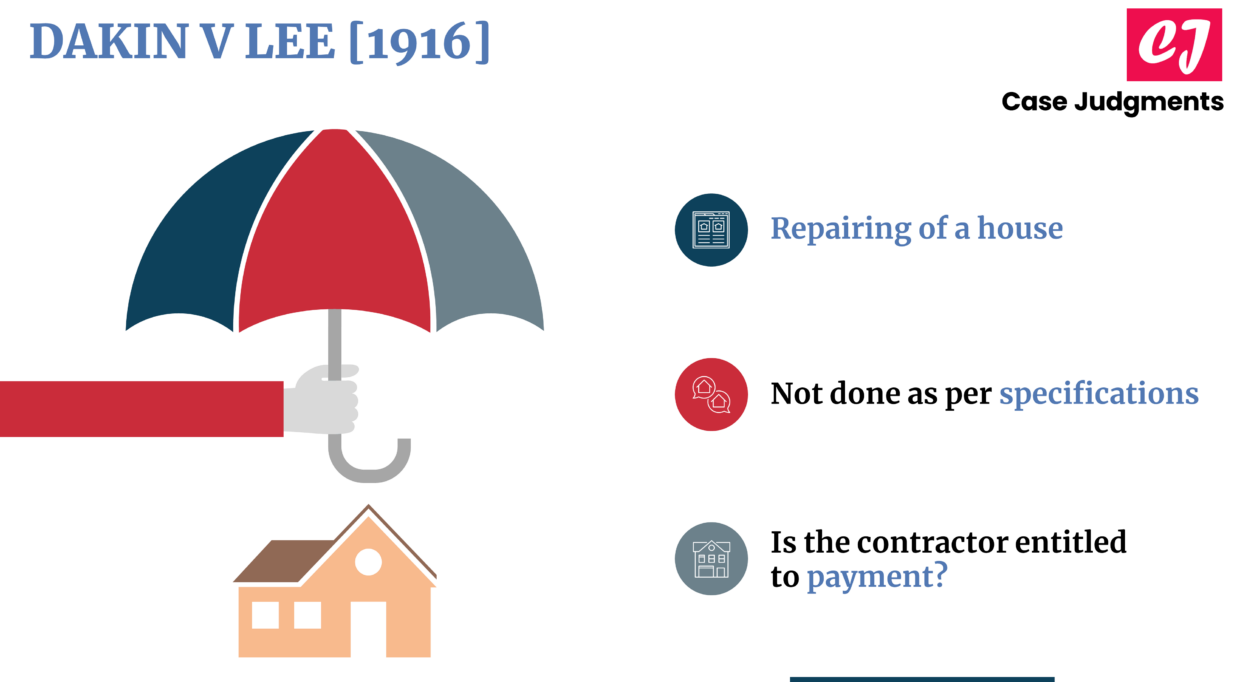
A Quick Summary of Dakin v Lee [1916]
Dakin v Lee [1916] is a contract law case that dealt with the issue of disputed repairs to a house. Given below are the case details:
- Case name & citation: H Dakin & Co Ltd v Lee [1916] 1 KB 566
- Jurisdiction: Court of Appeal of England and Wales
- Year of the case: 1916
- Area of law: Substantial performance; discharge by performance
Facts of the case
The contract in Dakin v Lee was for the repair of a house. The work was not done according to the specifications outlined in the contract. For example, the concrete underpinning was shallower than what was contracted, the columns supporting a bay window were of incorrect dimensions, and there were issues with improper installation of joists over the bay window.
Therefore, the defendant refused to make payment to the contractor.
Issue
Was the contractor entitled to recover money for the work done?
Judgment of the Court in Dakin v Lee
The official referee who examined the case determined that the plaintiff had failed to perform the contract and hence had no right to claim payment for the work.
However, the Court of Appeal highlighted a distinction between failing to complete a contract and completing it poorly. In this case, while the work was executed poorly, it was still deemed to be performed. That is, the contract had been completed, albeit inadequately. Thus, it was held that the plaintiff could recover payment for the work done, less deductions for the fact that it did not adhere to the contract requirements. He was allowed to recover the contract price minus the cost of fixing the defects.
The doctrine of substantial performance
This case rests on the principle of substantial performance. According to it, where the obligations under a contract have been performed to a substantial degree, even if there are minor deficiencies in the work, the party concerned may still be entitled to recover payment (with deductions to cover the cost of those deficiencies). However, this won’t apply when the deviations are significant enough to undermine the very purpose of the contract. Hence, how the doctrine of substantial performance is applied can vary based on jurisdiction and the details of individual cases.
Quotes from the case (Dakin v Lee)
The statement of the judges was as under:
“Where a builder has supplied work and labour for the creation or repair of a house under a lump sum contract, but has departed from the terms of the contract, he is entitled to recover for his services, unless: (1) the work that he has done has been of no benefit to the owner; (2) the work he has done is entirely different from the work which he has contracted to do; or (3) he has abandoned the work and left it unfinished.”
Note:
You might also want to refer to another similar case named Hoenig v Isaacs [1952].
List of references:
- https://nashashibilaw.weebly.com/uploads/2/0/5/9/20597118/the_modern_law_of_contract.pdf
- https://www.lawteacher.net/cases/discharge-cases.php
- https://www.studocu.com/en-gb/document/university-of-northampton/law-of-contract/discharge-of-a-contract/15325936
You might also like:
More from contract law:

